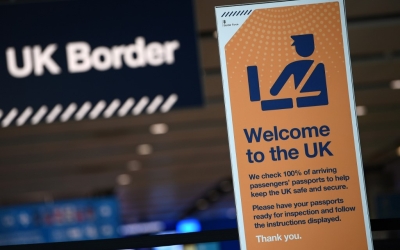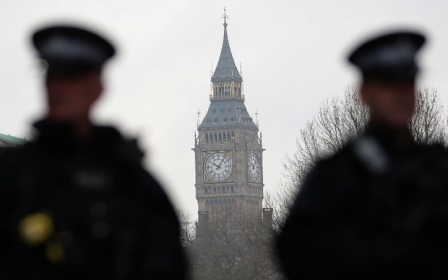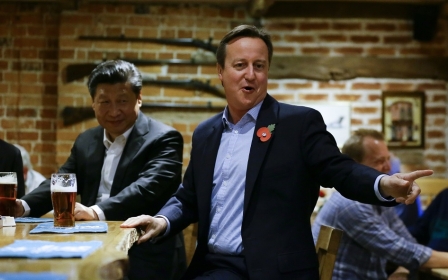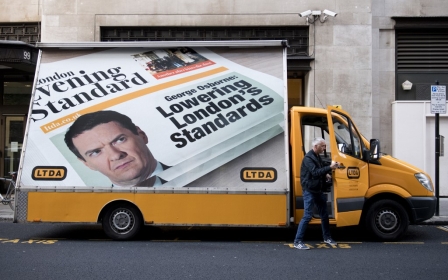British counterterrorism bill takes the country further down a dangerous road
Although Britain’s Counterterrorism and Sentencing Bill recently passed its second reading in parliament, there has been little attention paid to the implications of its dangerous proposals.
Even more concerning is that it has been pushed through at a time when parliament is not functioning at full capacity due to the coronavirus pandemic and when Prevent - the central plank in the government’s counter-extremism programme - is supposed to be under review.
This should have been a time of heightened critique and thorough research into the many failures of the Prevent strategy. If the inquiry were to actually do its job, it would deal a fatal blow to the counter-extremism apparatus in its entirety.
Since the Prevent review was announced in January 2019, a halt on expanding any projects related to counter-extremism should have been a basic gesture in demonstrating that the Home Office was “listening” to the growing opposition to Prevent.
Yet, the British government - Home Secretary Priti Patel in particular - seems instead to be capitalising on the current period of lockdown and Covid-19-centric news reporting, by putting forward a set of proposals likely to roll back civil liberties in the country even further.
New MEE newsletter: Jerusalem Dispatch
Sign up to get the latest insights and analysis on Israel-Palestine, alongside Turkey Unpacked and other MEE newsletters
There is no justification for harassing, marginalising and spending public funds on silencing the political expression of any individual
The bill would mean that those never convicted of any crime, but deemed to be terrorism suspects, would face further restrictions on their freedoms. Where previously there has been a two-year cap on terrorism prevention and investigation measures, the bill seeks to remove both the time restriction and the proof necessary to apply this to an individual. This effectively means even less evidence for heightened punishment.
The bill is also set to include a “serious terrorism sentence” of up to 25 years, with a 14-year minimum prison term, and to increase the power for judges to issue harsher sentences.
For those who doubt the connections between such legislative changes and the intentions of the government to seriously consider the concerns people have towards the Prevent programme, they need only look to the fact that the bill seeks to scrap the deadline for the independent review. The original statutory deadline for completion and release of the findings was August 2020; it is now to be extended by a year.
The Campaign Against Criminalising Communities (CAMPACC) highlighted in a recent statement that, “the greatest risk is for innocent individuals to be caught up and their lives seriously torn apart by the powers in the bill”.
Mounting criticism
In the last five years, around £200m ($252m) have been spent on Prevent, and all the Home Office has to show for it is mounting criticism, serious concerns raised by national and international bodies on the state of civil liberties in the country, and a continued failure to actually prevent attacks on British soil.
The recent stabbings in Reading should have been yet another reason for the government to reconsider its strategy. The attacker had been flagged to MI5 in the past, and even referred to Prevent. He had spent time in prison (for non-terrorism-related crimes), where the Prevent duty is also active, and had been known to have numerous mental health issues, which even contributed to a reduction in his previous jail sentence.
The opportunity that the Home Office does not seem to miss, however, is repressing political activists. Since the implementation of Prevent as a statutory duty five years ago, anti-fracking campaigners, anti-cuts students, and even children raising money for Palestine have been targeted.
So many red flags, yet fatalities were not prevented. This has been a constant throughout the last five years, and something that was raised after the Manchester Arena attack in 2017, when both MI5 and counterterrorism police were criticised for having missed every opportunity to prevent it.
There is no justification for harassing, marginalising and spending public funds on silencing the political expression of any individual. Yet, within the first year, £26.7m were spent, laying the foundations for further racist practices against the Muslim community, and strengthening restrictions on dissent.
Resources went towards referring more than 2,800 people under the age of 20 to Prevent in 2015-16, burdening them with traumas that they and their families are unlikely to ever fully shake. By 2018/19, spending rose to £47.3m, despite mass opposition from trade unions, teachers, health professionals, students, politicians and even UN representatives.
Remaining vigilant
As we enter what is expected to be the largest financial crisis since the Great Depression, questions need to be asked about the disproportionate financial resources given to such an unpopular and ineffective project. How will Prime Minister Boris Johnson’s government justify the continued spending in the face of mass job losses and a future of dire poverty for thousands across the country?
Or is it exactly because of the coming social crisis that further repressive measures are being sought by the government?
All previous reviews have been rubber-stamping exercises demanding nothing but limited cosmetic changes
It is important that we remain vigilant, now more than ever, over the next steps likely to be proposed by the government - especially in light of the upcoming appointment of an independent reviewer for the Prevent inquiry. Lest we forget, the initial choice was Lord Carlile, who was forced to step down after a legal challenge led by Rights Watch (UK) over his past advocacy and bias in favour of the Prevent strategy.
When the response comes from the very institution that benefits from counter-extremism programmes, it is unlikely to ever be truly transparent or just in its conclusions.
The clear outrage over what the government prioritises financially in a time of crisis, and its blatant disregard for implementing a fair process and a genuine inquiry, should be highlighted by social activists. Still, we should have no faith in this report.
All previous reviews have been rubber-stamping exercises demanding nothing but limited cosmetic changes. Power, after all, concedes nothing without a demand, as Frederick Douglass reminds us.
The views expressed in this article belong to the author and do not necessarily reflect the editorial policy of Middle East Eye.
Middle East Eye delivers independent and unrivalled coverage and analysis of the Middle East, North Africa and beyond. To learn more about republishing this content and the associated fees, please fill out this form. More about MEE can be found here.






